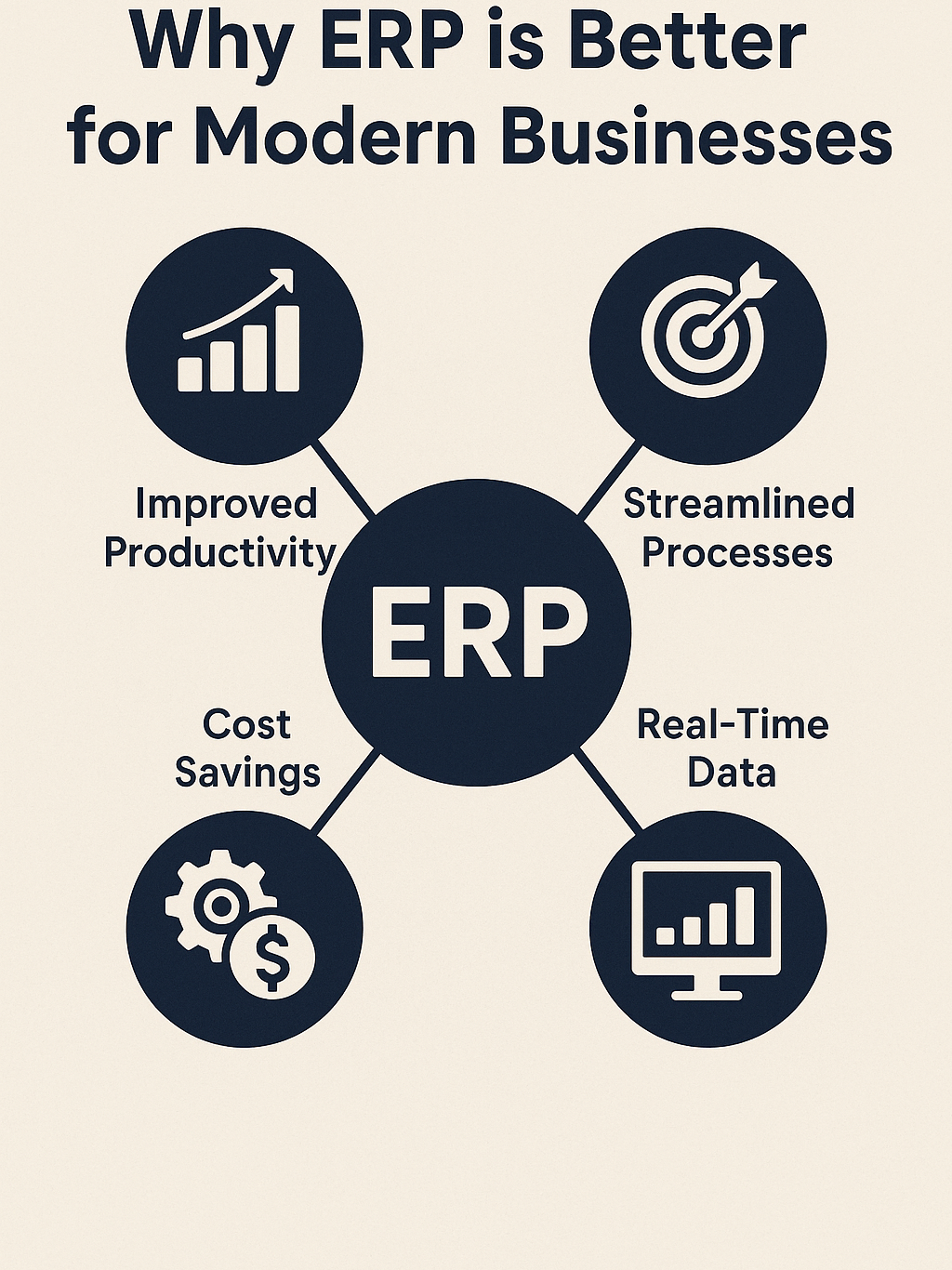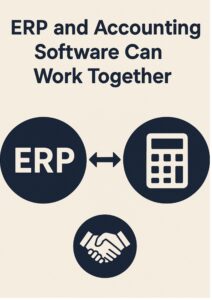ERP vs Accounting Software
What’s the Difference and Which One Do You Need?
🧩 Understanding the Basics: ERP and Accounting Software
In today’s digital economy, efficient management of business operations is non-negotiable. Companies—whether startups, midsized businesses, or mid-sized companies—need solutions that offer real-time control, visibility, and insights. Two common types of software often considered are Enterprise Resource Planning (ERP) systems and accounting software.
But what exactly sets them apart? And more importantly, which one do you, as a business owner, need for business growth?
🧠 What Is ERP Software?
Enterprise Resource Planning systems are far more comprehensive. An ERP is a business management software that integrates various core business functions into one centralized data repository. This includes:
Inventory management
Supply chain management
Human resource management
Financial management
Customer relationship management capabilities
Payroll processing
Inventory tracking
It’s essentially a single source of real-time truth for your entire business, helping eliminate manual processes and silos.
One shining example is Caddayn Biller, a modern cloud-based ERP system built to meet the demands of complex business processes with real-time visibility, data-driven decisions, and a 360-degree view of your organization.
📊 What Is Accounting Software?
Accounting software is designed specifically to manage your business’s financial operations. It focuses on core financial processes like:
Balance sheets
Income statements
Cash flow statements
Bank statements
Tax preparation
These accounting tools help small and mid-sized businesses maintain accounting records, streamline financial tasks, and ensure accurate reporting capabilities.
Popular examples include:
These are great for basic accounting software needs, especially if you’re managing dedicated accounting teams or stand-alone accounting software with limited requirements.

🔍 Why ERP is Better for Modern Businesses
If your business is expanding, working across departments, or handling inventory control, Caddayn Biller offers a more comprehensive solution than traditional accounting software.
With features such as:
Advanced expense tracking
Real-time information from every department
Streamlined operational workflows
Centralized control over financial activity, human resource, and raw materials
It delivers improved efficiency and deeper insight things that simple accounting packages can’t offer.
Features
Accounting Software
ERP Software
Scope
Focuses on financial processes only
Covers a wide range of business functions
Modules
Basic accounting functionality
Integrates human resource, inventory, CRM, and more
Real-Time Insights
Limited
Full real-time reporting across departments
Customization
Often has limited customization options
High level of customization
Data
Stores accounting records only
Stores accounting and retail records
🏢 When to Use Accounting Software
You may still consider stand-alone accounting software if:
You are a small business with only financial needs
There’s no need for inventory management tools
You don’t deal with customer interactions or employee training
Tools like QuickBooks and Zoho Books can help with tracking expenses, creating loss statements, and processing payroll management tasks with ease.
🏗️ When to Use ERP Software
Go for ERP accounting systems like Caddayn Biller if you:
Operate a mid-sized business or enterprise
Need visibility across all core business activities
Want to reduce human error through automation
Aim to grow into ecommerce businesses, retail, or automotive manufacturing company scale
Require alignment across finance department, operations, and HR
🔗 Integrating ERP with Other Platforms
Modern ERPs—especially cloud ERP like Caddayn Biller can integrate with:
E-commerce platforms
Inventory management software
Customer relationship tools
Payroll management systems
This digital transformation makes real-time data the norm, not the exception, supporting faster decisions and accurate decisions with minimal delays.
📝 Check how Oracle ERP Cloud handles cloud solution deployments, or how SAP Business One supports operational visibility.

💡 Benefits of Using Caddayn Biller ERP
Here’s where Caddayn Biller stands out:
✅ All-in-one dashboard for financial performance, inventory, CRM, and HR
✅ Cloud-based ERP system ensuring you’re connected anywhere
✅ Built-in financial reporting, reporting across departments, and audit tracking
✅ Designed to eliminate manual data entry errors and repetitive tasks
✅ Supports wide range of financial aspects, core accounting functions, and additional features
Whether you’re handling bills of materials, cash flow, or employee training, Caddayn Biller makes it easy.
🌐 Explore Caddayn Biller
🏁 ERP and Accounting Software Can Work Together
You don’t always have to pick one. Some companies integrate basic accounting functionality within ERPs. For instance, Caddayn Biller includes robust accounting features like:
General ledger
Financial statements
Accounting module with tax-ready data
Built-in expense tracking and accounting tasks
This integration helps teams—finance team, HR, operations—work from a single source of truth.

Cost Considerations: ERP vs Accounting Software
Lets talk money
Cost Type
Upfront Costs
Ongoing Costs
Operational Costs
Accounting Software
Low
Monthly/Annual Subscriptions
Low
ERP Software
Moderate to High
Higher but includes more
Covers multiple departments
🎯 Final Thoughts: Which One Do You Need?
If you need a tool just for financial controls, basic accounting software like Tally or QuickBooks might do the job.
But if you’re running a business size beyond five employees, managing complex operations, or want enterprise-wide reporting, then Enterprise Resource Planning systems like Caddayn Biller offer a far better long-term solution.
ERP is the future of business software. Let your team move away from manual processes and towards intelligent automation and decision-making.
🚀 Ready to Move Beyond Basic Accounting?
Caddayn Biller isn’t just another ERP—it’s your growth partner.
It offers everything from accounting services and inventory control to human resource management and financial reporting—all in one comprehensive solution.
